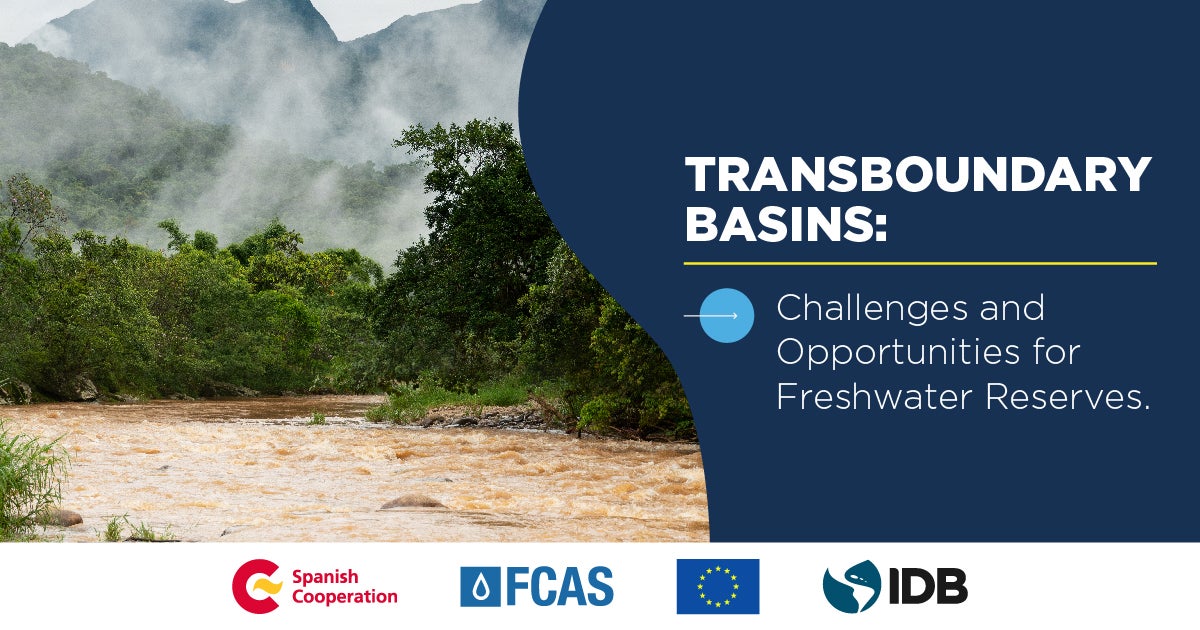Spanish version available
Balancing water needs and the sustainability of ecosystems is the key to guaranteeing access to water in a sustainable manner. On World Environment Day, we present a water management model for transboundary basins that achieves this goal.
By Andrea Ortega C. and Eveline Vasquez-Arroyo
Water is a finite resource and Latin America and the Caribbean have an important reserve of the world’s fresh water. However, without proper management, we not only run the risk of not guaranteeing access to water for the entire population, but we could even regress. One way to do it is through an integrated management of water resources, however, few countries carry out this type of management, putting the world’s most important freshwater reserves at risk.
According to UN Water, we need to quadruple the current rate of progress of safely managed services to reach the Sustainable Development Goal 6 of global access to water by 2030. If we continue at the current rate, coverage will only reach 81% of the population and 1.6 billion people will continue to live without safely managed services by the deadline in seven years.
In Latin America and the Caribbean, more than half of the countries register medium-low to very low levels of implementation of integrated water resource management, according to these studies. That is why many countries will have to exponentially increase their implementation rate if they want to achieve Sustainable Development Goal 6. Therefore, it is important to consider integrated management, particularly when dealing with natural resources that represent important reserves of freshwater, such as transboundary basins.
Transboundary basins are relevant for water resource optimization. Over 70% of the region’s surface water flows in basins shared between countries, so the management of transboundary basins, such as the Pantanal, is a crucial aspect to protect natural resources and the environment.
Pantanal: A vital reserve for Latin America and the Caribbean
Pantanal is an example of this type of reserve in Latin America and the Caribbean. It is the world’s largest tropical wetland, covering 170,000 square kilometers shared between Bolivia, Brazil and Paraguay, which has a variety of interconnected and interdependent biomes. However, the lack of conservation incentives, the effects of rainfall variation together with other climatic factors, and its fragile management caused that, Pantanal – also known as the largest wetland in the world – started to dry up. For this reason, the governments of these countries signed the Pantanal Declaration on World Water Day in 2018, as a commitment to promote its conservation and sustainable development.
However, having three different countries manage a natural resource in a coordinated manner is very challenging. To establish a management model for transboundary inland water systems that is appropriate for this area, the Inter-American Development Bank (IDB), with funds from the European Union through the Latin American Investment Facility (LAIF), and the Cooperation Fund for Water and Sanitation (FCAS) of the Government of Spain, is developing a technical cooperation for integrated management of water resources in the Upper Paraguay River Basin – Pantanal.
The objective of this project is to help the governments of Bolivia, Brazil and Paraguay to develop an integrated action that guarantees water security, through studies that evaluate water balances that preserve the basins, optimizes water resources and ecosystems’ conservation by considering potential climatic and non-climatic effects that might occur in the future. These actions, in addition to strengthening water governance and its connectivity, will generate knowledge of the area for better decision-making.
In addittion, the project articulates the Pantanal Initiative through coordination of international processes, institutional contacts, identification of specific work areas, design of interventions and programming strategies, and initiation of technical studies.
Pantanal can benefit the water management of all three countries, however, its conservation is relevant for the entire world. In addition, it will have a positive impact on the social and economic well-being of the population and the conservation of ecosystem services, their biodiversity and connectivity.
During its first months, the project studied, analyzed and carried out a diagnosis of Pantanal’s situation at a cross-border level. Also, it will design a new hydrological/hydraulic modeling tool, which will be transferred to the three countries. The results of this project will contribute to a new IDB project in partnership with the United Nations Environment Program (UNEP) and co-financed by the Global Environmental Facility (GEF), which will promote the water security through the strengthening of transboundary water governance, sustainable development, and intersectoral integrated management of the Pantanal.
The project is expected to be completed by the end of this year, marking a milestone for sustainable development and integrated management in one of the most important freshwater sources in the region. For this reason, the IDB and the Spanish Agency for International Development Cooperation (AECID in Spanish), through the Cooperation Fund for Water and Sanitation, are committed to projects such as Pantanal that not only improve water management, but also show the power that alliances between countries have for the protection of a resource that crosses borders. An important reminder, on the 50th anniversary of World Environment Day, an instance to raise awareness and draw attention to issues that affect our ecosystem.
To learn more about the work of FECASALC and its projects in the last 12 years, download “Advances and contributions of FECASALC to the water and sanitation sector in Latin America and the Caribbean“.
Guest Authors
Andrea Ortega Carreño is a Communication Consultant for the IDB and Spanish Cooperation and supports the Spanish Cooperation Fund for Water and Sanitation for Latin America and the Caribbean (FECASALC). She is a doctoral candidate in Feminist and Gender Studies at the Universidad Complutense de Madrid.
Eveline Vasquez-Arroyo is a consultant for IDB’s Water and Sanitation Division of the Infrastructure and Energy Sector (WSA/INE). She has a PhD and a Master’s in Energy and Environmental Planning, and has several years of experience in the interaction of climate change with the integration of water, energy and food security.


Leave a Reply